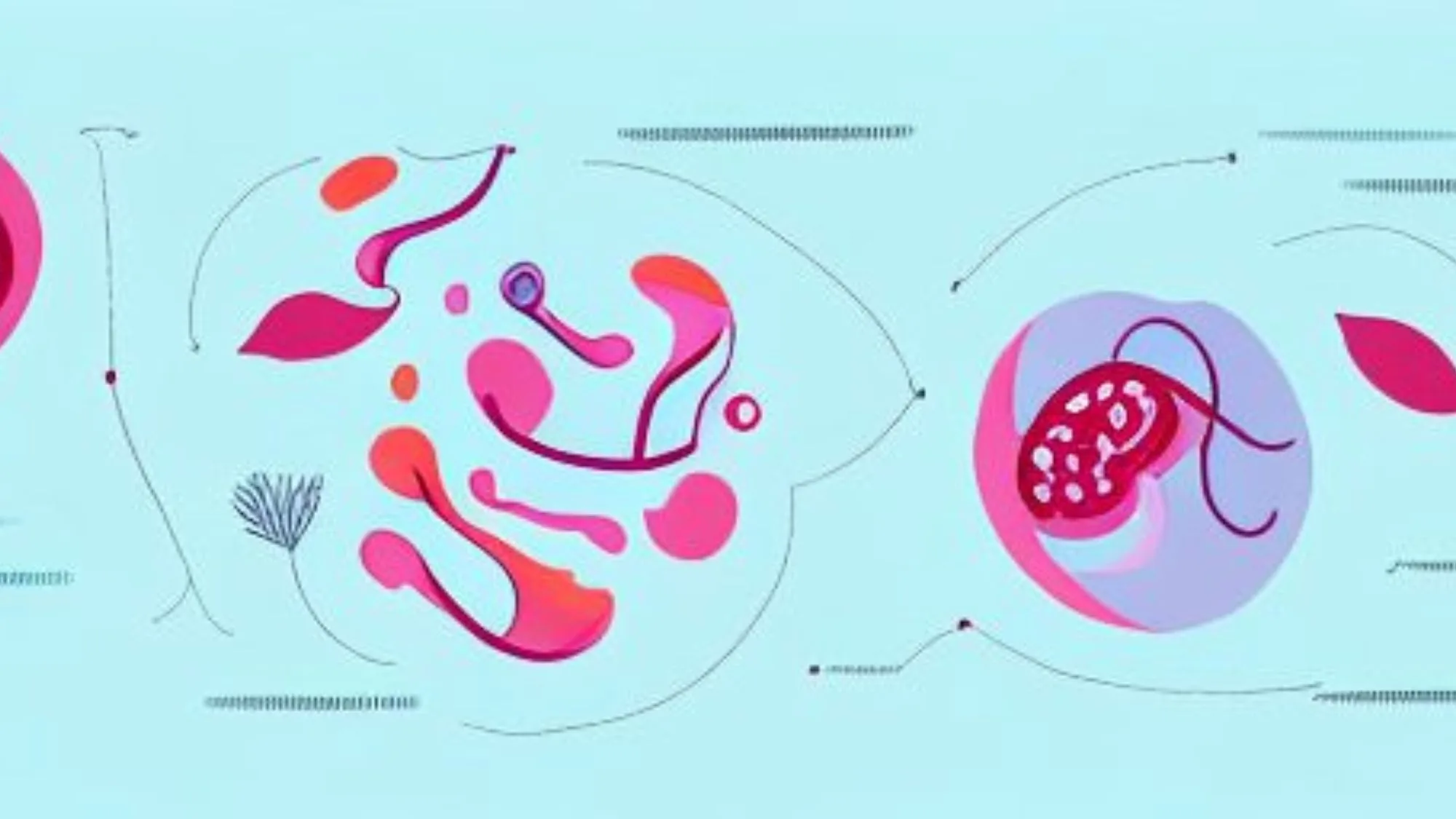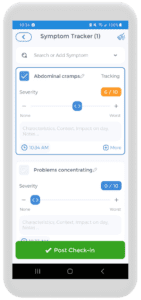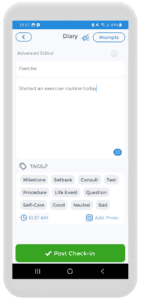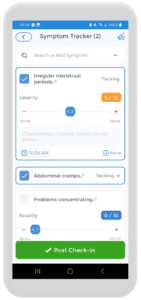
If you are among the millions of women who suffer from polycystic ovarian syndrome (PCOS), you are no stranger to chronic pain and discomfort during menstrual cycles. PCOS is a complex hormonal disorder that affects the female reproductive system, often leading to irregular periods and severe period pain. While there is no cure for PCOS, there are several ways to manage the symptoms, including menstrual cramps. In this article, we will explore the causes of PCOS, lifestyle changes that can help manage the condition, medical treatments, natural remedies, and signs that it’s time to seek professional healthcare.[1][2][3][4][5][6]
Understanding PCOS and Its Symptoms
What is PCOS?
Polycystic ovarian syndrome is a hormonal disorder that affects the ovaries in women. It causes an imbalance in the hormones responsible for regulating the menstrual cycle, leading to the development of cysts or small, fluid-filled sacs. These cysts can interfere with the normal release of eggs and cause a variety of symptoms, such as irregular periods, fertility problems, and acne. Women with PCOS also have a higher risk of developing type 2 diabetes, heart disease, and other health problems.
Common Symptoms of PCOS
The symptoms of PCOS can vary from woman to woman, but here are some of the most common ones that many women experience:
- Irregular menstrual cycle or no periods at all
- Heavy bleeding during periods, compared to the average menstrual cycle
- Severe period pain and severe cramping pain
- Painful menstrual cramps
- Acne and oily skin
- Excessive hair growth on the face, chest, or back
- Weight gain or difficulty losing weight
- Fertility problems
- Mood swings and depression
It’s important to note that not all women with PCOS will experience all of these symptoms. Some may only experience a few, while others may experience several. Others may experience mild symptoms compared to those that experience severer PCOS period pain.
How PCOS Affects Menstrual Cramps
One of the most uncomfortable symptoms of PCOS is menstrual cramps. These period cramps can range from
But menstrual cramps aren’t the only way PCOS can affect the menstrual cycle. Women with PCOS may also experience irregular periods, meaning their menstrual cycle may come too frequently or not frequently enough. This can make it difficult to predict when their period will start, making it harder to plan for social events or vacations.
Additionally, women with PCOS may experience heavy bleeding during their periods. This can be especially problematic for those who have jobs or lifestyles that make it difficult to take frequent bathroom breaks or change pads or tampons regularly.
Managing PCOS Symptoms
While there is no cure for PCOS, there are ways to manage its symptoms. One of the most effective ways is through lifestyle changes, such as eating a healthy diet, getting regular exercise, and maintaining a healthy weight. Women with PCOS may also benefit from certain medications, such as birth control pills or metformin, which can help regulate their hormones and improve their menstrual cycles.
It’s important for women with PCOS to work closely with their healthcare providers to develop a treatment plan that’s right for them. With the right care and management, women with PCOS can lead happy, healthy lives.[7][8]
Lifestyle Changes to Manage PCOS Cramps
Importance of a Balanced Diet
A balanced diet is key to managing PCOS symptoms, including menstrual cramps. Eating a diet rich in whole foods, fruits, and vegetables can help reduce inflammation, regulate blood sugar levels, and support hormonal balance. In addition to these benefits, maintaining a healthy diet can also provide other health benefits such as reducing the risk of heart disease and cancer.
When planning your diet, it is important to include foods that are high in fiber, such as whole grains, fruits, and vegetables. Fiber can help regulate bowel movements and reduce constipation, which can be a common symptom of PCOS. Additionally, including healthy fats, such as those found in nuts, seeds, and avocados, can help reduce inflammation in the body and support hormonal balance.
Foods to avoid include processed foods, sugary drinks, and foods high in refined carbohydrates. These types of foods can cause a spike in blood sugar levels, leading to insulin resistance and inflammation. Keeping a food journal can be helpful in identifying trigger foods that exacerbate your PCOS symptoms.
Exercise and Its Benefits for PCOS

In addition to its physical benefits, exercise can also help improve your mood and boost self-confidence. Finding an exercise routine that you enjoy can help you stay motivated and committed to your health goals. Consider joining a fitness class or finding a workout buddy to help keep you accountable.
Stress Management Techniques
The negative effects of stress on PCOS symptoms are well-known. When stress levels go up, cortisol levels, a hormone that exacerbates PCOS symptoms, also increase, leading to more inflammation and hormonal imbalances. Mind-body techniques, such as meditation, yoga, and deep breathing exercises, can help reduce stress, anxiety, and depression.
Other stress-reducing activities can include spending time in nature, practicing mindfulness, or engaging in a hobby that you enjoy. Finding ways to manage stress can significantly reduce the intensity of menstrual cramps and improve your overall quality of life.
Prioritizing Sleep and Rest
Getting enough sleep is crucial for managing PCOS symptoms, including painful menstrual cramps. Sleep deprivation can lead to increased inflammation and cortisol levels, worsen insulin resistance, and negatively affect the immune system. Aim for at least 7-8 hours of sleep each night, and practice good sleep hygiene, such as avoiding screen time before bed and keeping your bedroom cool and dark.
In addition to getting enough sleep, it is also important to prioritize rest and relaxation. Taking breaks throughout the day to rest and recharge can help reduce stress levels and improve overall well-being. Consider taking a short walk, reading a book, or practicing a relaxation technique during your breaks.[9][10][11]
Medical Treatment for PCOS Cramps
Polycystic Ovary Syndrome, or PCOS, is a hormonal disorder that affects many women of reproductive age. One of the most common symptoms of PCOS is menstrual cramps, which can be debilitating and affect a woman’s quality of life. Fortunately, there are several medical treatments available to help manage PCOS cramps.
Hormonal Birth Control Options
Hormonal birth control methods, such as the pill, patch, and ring, can help regulate menstrual cycles and reduce the frequency and severity of menstrual cramps. These methods work by suppressing ovulation, reducing the production of prostaglandins, and preventing the thickening of the uterine lining. Hormonal birth control methods can also help alleviate other PCOS symptoms, such as acne and excess hair growth.
It is important to note that hormonal birth control methods may not be suitable for all women with PCOS. Women who smoke, have a history of blood clots, or have certain medical conditions may not be able to use hormonal birth control. It is important to discuss your medical history with your healthcare provider before starting any new medication.
Pain Relievers and Anti-Inflammatory Medications
Over-the-counter pain relievers and nonsteroidal anti-inflammatory drugs such as ibuprofen and naproxen can help manage menstrual cramps and pelvic pain. These medications work by blocking the production of prostaglandins, reducing inflammation, and easing menstrual pain. Anti-inflammatory medications can also be prescribed by a healthcare professional for more severe cases and can significantly alleviate the symptoms of menstrual cramps in women with PCOS.
It is important to follow the recommended dosage and not exceed the maximum daily dose of these medications. Overuse of pain relievers can lead to serious side effects, including stomach ulcers and liver damage.
Alternative Therapies and Supplements
Alternative therapies such as acupuncture, chiropractic treatment, and massage therapy, can serve as valuable additions to traditional treatments for managing PCOS symptoms, including menstrual cramps. These therapies can help reduce stress and tension in the body, which can contribute to menstrual cramps.
Supplements, such as magnesium and omega-3 fatty acids, can also help reduce inflammation and relieve period pain. However, it is important to consult a healthcare professional before using any supplements or alternative treatments, as they may interact with other medications or medical conditions.
In conclusion, there are several medical treatments available to help manage PCOS cramps. Hormonal birth control methods, pain relievers, anti-inflammatory medications, alternative therapies, and supplements can all be effective in reducing frequent and severe period pain. It is important to discuss your symptoms and medical history with your healthcare provider to determine the best course of treatment for you.[12]
Natural Remedies for PCOS Cramps
Heat Therapy for Pain Relief
Polycystic Ovary Syndrome (PCOS) is a hormonal disorder that affects many women. One of the most common symptoms of PCOS is menstrual cramps, which can be quite painful. Heat therapy, such as using a heating pad or taking a warm bath, is a simple and effective home remedy for menstrual cramps. Heat helps increase blood flow to the uterus, which can help reduce inflammation and ease abdominal cramps. Applying heat to the lower abdomen can provide immediate relief from menstrual cramps.
In addition to heat therapy, there are several other natural remedies that can help reduce menstrual cramps in women with PCOS.
Herbal Teas and Supplements
Drinking herbal teas can also help reduce menstrual cramps in women with PCOS. Tea made with ginger, cinnamon, and chamomile can provide anti-inflammatory and pain-relieving effects. Ginger has been shown to be particularly effective in reducing menstrual cramps. Supplements such as magnesium and omega-3 fatty acids can also have benefits on reducing abdominal cramps and inflammation.
It is important to speak with a healthcare provider before taking any supplements, as some may interact with medications or have side effects.
Essential Oils and Aromatherapy
Aromatherapy and essential oils can also be effective in reducing menstrual cramps. Essential oils, such as lavender and peppermint oil, can be diluted in a carrier oil and applied to the lower abdomen during menstrual cramps. Using aromatherapy diffusers can also help improve relaxation and relieve stress, which can be beneficial in reducing the intensity of menstrual cramps.
It is important to note that essential oils should be used with caution, as they can be potent and may cause allergic reactions in some individuals. It is best to dilute essential oils in a carrier oil before applying them to the skin.
Massage and Acupressure Techniques
Massage and acupressure techniques can also help reduce menstrual cramps. Massaging the lower abdomen, or using pressure points on the hands and feet can help relieve menstrual cramps. Additionally, regular massage therapy can improve circulation, relieve stress, and reduce inflammation, making it an excellent complementary therapy for women with PCOS.
Acupressure has been used for centuries in traditional Chinese medicine to treat a variety of ailments, including menstrual cramps. By applying pressure to specific points on the body, acupressure can help stimulate blood flow and reduce pain and inflammation.
In conclusion, there are several natural remedies that can help treat period pain and reduce menstrual cramps in women with PCOS. Heat therapy, herbal teas and supplements, essential oils and aromatherapy, and massage and acupressure techniques can all be effective in reducing pain and inflammation. It is important to speak with a healthcare provider before trying any new remedies, particularly if you are taking medications or have any underlying health conditions.[13][14][15]
When to Consult a Healthcare Professional
Polycystic Ovary Syndrome (PCOS) is a common hormonal disorder that affects women of reproductive age. It can cause a range of symptoms, including irregular periods, acne, weight gain, and excess hair growth. If you suspect that you may have PCOS, it is essential to consult a healthcare professional for proper diagnosis and treatment.
Identifying Severe Symptoms
While some symptoms of PCOS may be mild, others can be severe and require immediate medical attention. If you experience intense and prolonged menstrual cramps, severe mood swings, or excessive bleeding during menstrual period, make sure to consult a healthcare professional immediately. These symptoms could indicate other underlying medical conditions and require prompt intervention.
Additionally, if you experience sudden and severe abdominal pain, chest or pelvic pain, or shortness of breath, seek medical attention right away. These symptoms could indicate a medical emergency and require immediate treatment.
Monitoring Changes in Your Menstrual Cycle
Keeping track of changes in your menstrual cycle is an excellent way to identify potential PCOS symptoms, such as painful periods. If you notice an increase in the severity of your menstrual cramps or other symptoms, seek medical advice.
It is also essential to monitor any changes in your menstrual cycle, such as irregular periods or missed periods. These changes could indicate other underlying medical conditions that require medical attention.
Seeking Support and Resources for PCOS Management
Going through PCOS can be challenging and emotionally draining. Joining support groups or consulting with healthcare professionals and nutritionists can help provide resources and advice for managing the symptoms of PCOS. Seeking emotional support from friends and loved ones can also help improve your mental health and well-being.
In addition to emotional support, it is essential to make lifestyle changes that can help manage PCOS symptoms. These changes may include regular exercise, a healthy diet, and stress management techniques.
Overall, if you suspect that you may have PCOS or experience any severe symptoms, it is essential to consult a healthcare professional for proper diagnosis and treatment. With the right support and resources, you can manage the symptoms of PCOS and improve your overall health and well-being.[16]
Using the CareClinic App to Fight PCOS Cramps
People with PCOS diagnosed may find the CareClinic App beneficial. The app can act as your personal
As we have mentioned, lifestyle factors are important to fight PCOS. On the app, you can also track your physical exercise and diet to ensure you are eating balanced meals at regular intervals. We hope to help old and young women combat PCOS as streamlined a process as possible!
PCOS is a medical condition that can cause several uncomfortable symptoms, including menstrual cramps. Fortunately, several lifestyle changes, medical treatments, natural remedies, and professional support options can help manage the symptoms. A combination of these approaches can help you find relief from severe pain from PCOS and improve your overall quality of life.
Sources:
- https://www.hopkinsmedicine.org/health/conditions-and-diseases/polycystic-ovary-syndrome-pcos
- https://www.mayoclinic.org/diseases-conditions/pcos/symptoms-causes/syc-20353439
- https://www.cdc.gov/diabetes/basics/pcos.html
References
- “9 PCOS Period Pain Relief Tips”. https://www.pcoshelp.com/blogs/period-pain-be-gone-9-pcos-period-pain-relief-tips
- “Does PCOS Cause Cramps?”. https://healthmatch.io/pcos/pcos-cramps
- “Does PCOS Worsen Cramps? | Pain Relief Strategies”. https://wellwisp.com/does-pcos-worsen-cramps/
- “Managing PCOS Pain | Genesis OBGYN Tucson AZ”. https://genesisobgyn.net/managing-pcos-pain/
- “Understanding & Managing Painful Periods With PCOS – The PCOS Nutritionist Alyssa”. https://pcosnutritionistalyssa.com/painful-periods/
- “PCOD and Menstrual Health: Tips for Regulating Periods and Managing Pain | Medanta”. https://www.medanta.org/patient-education-blog/pcod-and-menstrual-health-tips-for-regulating-periods-and-managing-pain
- “Polycystic Ovary Syndrome (PCOS) | Johns Hopkins Medicine”. https://www.hopkinsmedicine.org/health/conditions-and-diseases/polycystic-ovary-syndrome-pcos
- “Polycystic Ovary Syndrome (PCOS) | Diagnosis & Treatment | UCHealth”. https://www.uchealth.org/diseases-conditions/polycystic-ovary-syndrome/
- “PCOS Management: 4 Lifestyle Changes That Can Help: Luxe Women's Health: OB/GYNs”. https://www.luxewomenshealth.com/blog/pcos-management-4-lifestyle-changes-that-can-help
- “Stress Reduction for Women with PCOS: Techniques to Balance Your Mind and Body”. https://www.saffronsageliving.com/blog/stress-reduction-for-women-with-pcos
- “Lifestyle interventions for PCOS – Dr. Bojana”. https://drbojana.com/lifestyle-interventions-for-pcos/
- “How to Recognize and Effectively Treat Polycystic Ovary Syndrome Symptoms Pain| Dr. Anshu Agarwal”. https://www.dranshuagarwal.com/blog/polycystic-ovary-syndrome-symptoms-pain
- “Heat therapy for primary dysmenorrhea: A systematic review and meta-analysis of its effects on pain relief and quality of life – PMC”. https://pmc.ncbi.nlm.nih.gov/articles/PMC6214933/
- “Best Teas For Menstrual Cramp Relief And Comfort”. https://scientificorigin.com/best-teas-for-menstrual-cramp-relief-and-comfort
- “3 Herbs and Supplements for Menstrual Pain – 3 In 1 Nutrition”. https://www.3in1nutrition.com/posts/3-herbs-and-supplements-for-menstrual-pain
- “When to Seek Help for PCOS – Lafeyette PCOS Treatment”. https://www.fertilityanswers.com/female-infertility/seeking-help-for-pcos/
- “Managing the Symptoms of Polycystic Ovary Syndrome (PCOS) | University Hospitals”. https://www.uhhospitals.org/blog/articles/2022/04/managing-the-symptoms-of-polycystic-ovary-syndrome
- “How to Manage Polycystic Ovary Syndrome: PCOS Symptoms & Treatment | BASS Medical Group”. https://www.bassmedicalgroup.com/blog-post/pcos-symptoms-treatment


